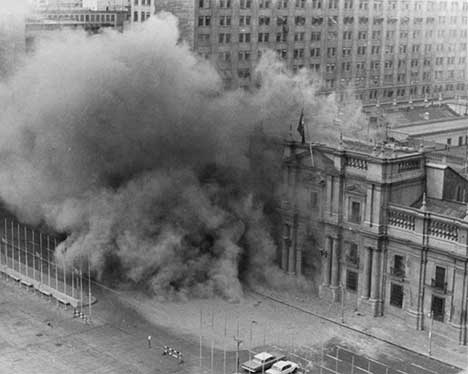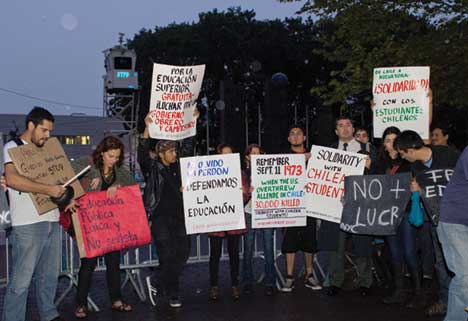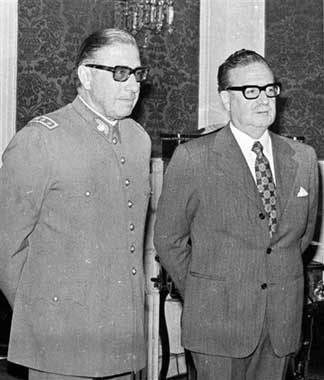
October 2011
Chile: Constituent Assembly and Workers Power
 Aerial bombardment of
La
Aerial bombardment of
La
The following
article is translated from a special issue
of El
Internacionalista (October
2011).
Ever since
the University Reform movement was born in
Thus, a fundamental
conclusion that must be drawn from the
1999-2000 student strike at the National
Autonomous University of Mexico (UNAM) is
the utter necessity of fighting for class
independence from all
bourgeois parties and politicians. The
support of a sector of the UNAM strikers
to the popular front around the Party of
the Democratic Revolution (PRD) weakened
the struggle. The PRD lashed out against
the “ultras” and “mega-ultras” and tried
to organize scabs. The PRD government of
the Federal District (encompassing
 Protest
at the United Nations in solidarity with
Chilean students, September 22.
Protest
at the United Nations in solidarity with
Chilean students, September 22.In Chile,
students have allied with Concertación
(a coalition of the Christian Democracy [DC],
the Socialist Party [PS] and their
satellites), which only pretends to support
the movement. The Communist Party (PCCh) and
other leftist groups (Movement of the
Revolutionary Left [MIR], Manuel
Rodríguez Patriotic Front [FPMR],
Communist Party-Proletarian Action [PC-AP])
compete in the elections under another rubric,
the “Together We Can Do More” (Juntos Podemos
Más) coalition, which is just a
mini-popular front with minority bourgeois
sectors like the Radical Party and the
Christian Left, which were also part of
Popular Unity (UP) under Allende. In fact, the
axis of a revolutionary program to win the
present struggle for free public education is
to draw the lessons of the UP and the Allende
government, in the previous Battle of Chile.
The most
important of the factors that led to defeat
at the hands of Pinochet’s henchmen was not
that the working people were not armed,
although this had terrible consequences, but
that the workers were politically disarmed.
Not only the PS and the PCCh, but also the
MIR, the MAPU (Popular Unity Action
Movement), and leftist sectors of the PS
which were influential in the cordones
industriales, workers’
council-like organizations that developed in
the final year of Allende’s government,
bound themselves to the end to the politics
of the popular
front. They thereby
chained the workers movement (along with
peasants, the urban poor, students etc.) to
alliances with capitalist sectors, either
directly, or by voting for the constituent
parties of the UP, as did the MIR in the
elections of March 1973. In order to triumph
over the counterrevolution fostered (and
financed) by Yankee imperialism, it was
essential to make a clear break with all the parties
of the UP and their deceptive promise of
“people’s power,” and fight directly for workers
revolution.
One Chilean
group that criticizes popular-frontism is the
PTR (Partido de Trabajadores Revolucionarios –
Revolutionary Workers Party), which is part of
the Trotskyist Fraction (FT) led by the PTS
(Partido de Trabajadores Socialistas –
Socialist Workers Party) of Argentina, and
publishes the journal Clase contra Clase.
The PTR has criticized the PCCh for its
capitulations, notably for its not insisting
that the call for free public education should
be the absolute “bottom floor” demand, rather
than a far-off “perspective.” In contrast to
the vituperations in the bourgeois press about
the “hoodies” (lower-class high school
students) and the complaints of the PC and
Concertación “moderates” against
rock-throwing, the PTR defends the youth who
have fought in the streets against the
attempts by the carabineros
to brutally stop “unauthorized” marches.
However, in broader terms, the PTR shares the
reformists’ “democratist” focus. In the latest
issue of its newspaper Clase
contra Clase (No.
168, 28 August) and in various articles
appearing in the newspaper of the PTS, La
Verdad Obrera, they put forward the
slogan of “a Free and Sovereign Constituent
Assembly,” to replace the Pinochetist
constitution, as their “maximum program” for
this struggle.
With different
formulations, the constituent assembly slogan
is also taken up by the PCCh, the MIR and
almost all the “far left” groups. Among these
is the Revolutionary Party of the Workers (PRT
– Partido Revolucionario de los Trabajadores),
a sympathizing section of the International
Workers League (LIT), representing the main
body of the political current led for years by
the late pseudo-Trotskyist leader Nahuel
Moreno. The FT also has its roots in
Morenoism, even though it grew critical of its
mentor after breaking away from the LIT in
1989, shortly after
In many
Latin American countries, a limited
bourgeois “democracy” has held sway for some
time, in which elected positions are put on
the market every few years, to be sold to
the highest bidder in voting dominated by
money (for television ads, vote-buying,
etc.) In
In the midst
of a struggle for democratic rights, like free
public education open to all, the call for a revolutionary
constituent
assembly could serve as a subordinate
element
of the program for the seizure of power by
the proletariat in Chile, by means of
its own organs of class power, that is, worker
councils like the soviets in Russia, and for
the extension of the socialist revolution to
the rest of the Southern Cone and the entire
hemisphere, into the heart of U.S.
imperialism. To call instead for a constituent
assembly as if it were an exercise in
electoral democracy, as do the reformists of
the PC and the pseudo-Trotskyist centrists of
the PTR/FT, feeds the same illusions as
Allende and his comrades of the PCCh and PS
did with their imaginary “parliamentary road”
to revolution, with the same deadly
consequences that we know all too well. To
visualize this in more detail, it suffices to
consider just which clauses of the current
Pinochetist constitution would have to be
thrown out.
First we have
the National Security Council (Cosena),
created by the 1980 constitution to watch over
the president, the legislature and the courts.
Even though it no longer has an automatic
majority of military men (from the chiefs of
the Army, Navy, Air Force and carabineros),
and
though its role is now described as “advising”
the president on matters of national security,
it is also charged with “carrying out the
other functions accorded to it by the
Constitution.” And according to Organic
Constitutional Law No. 18.415, one of said
functions of the Cosena is to authorize the
declaration of martial law by the president without
the approval of Congress – a point of no
small importance. Next there’s the great
autonomy of the armed forces from civilian
control. Uniquely in the Western Hemisphere,
the president of
 The People United will Never
be Defeated? This slogan of the Popular
Front was false to the core. The workers,
“united” with their class enemies, were
defeated in Chile. Right: General Augusto
Pinochet together with President Salvador
Allende, 23 August 1973. Pinochet, a
respected “constitutionalist” officer,
orchestrated the coup using the authority
given to him by the Popular Unity
government. (Photo:
AP)
The People United will Never
be Defeated? This slogan of the Popular
Front was false to the core. The workers,
“united” with their class enemies, were
defeated in Chile. Right: General Augusto
Pinochet together with President Salvador
Allende, 23 August 1973. Pinochet, a
respected “constitutionalist” officer,
orchestrated the coup using the authority
given to him by the Popular Unity
government. (Photo:
AP)
The funding
of the military is another aspect. Under
Pinochet, almost all the state-owned
companies were privatized, except for one:
CODELCO. The nationalization of the copper
mines, carried out by the Popular Unity
government in 1971, was maintained, although
concessions were granted to private
subcontractors for production. Why this
exception? Could it be because according the
Reserve Law on Copper, 10 percent of copper
sales are set aside for the arms budget?
These are not questions of secondary
importance. The constitutional clauses on
the regulation of the armed forces are
almost identical to those contained in the
Statute of Constitutional Guarantees that
Allende was obliged to sign in October of
1970 as a condition for his confirmation as
President. As this pledge itself indicated,
these stipulations guaranteed the
independence of the military and police
forces, the backbone of the capitalist
state, against all “interference” from
elected officials.[1] This was
essential to the future preparation of the coup
d’état of 1973. Today as well,
the generals would defend their privileges
and their immunity with tooth and nail (and
machine guns and tanks) against any attempt
to touch them, no matter how democratic it
may be.
There are many
other anti-democratic aspects of the present
constitution: it bans strikes by national and
local government workers, and by workers who
“provide services of public utility.” It
prohibits associations, movements,
organizations or groups that carry out the
activities of political parties without
conforming to the regulations on the latter,
which include the requirement to hand over
membership lists to government agencies. It
prohibits “associations contrary to morality,
public order, and state security.” It
prohibits unions from taking part in “partisan
political activities,” and does not allow
union officials to hold leading positions in
political parties. A constitutional article
against terrorism has been used against
indigenous Mapuche people who are fighting for
their land. Not only can the president declare
a “state of exception,” he can also proclaim
“decrees with the force of law” on a great
variety of matters, education for example,
without congressional approval. Without a
doubt, a struggle for democratic rights would
have to throw this authoritarian constitution
in the garbage. But how?
In recent
years, many currents on the left have
substituted a democratic program for their
former socialist and communist pretensions.
Social democrats, ex-Stalinists, and small
groups claiming to be Trotskyist have all made
the call for a constituent assembly their
calling card. In many cases, such as in
If a
constituent assembly is to be an effective
instrument for the struggle for free public
education, and for the raising of the
revolutionary consciousness of the movement,
it is necessary to explain why
the constituent assembly is needed and what
tasks it must carry out. Neither the PC, nor
the PTR, PRT, or any other leftist group that
raises the constituent assembly slogan, does
this. First of all, it will be necessary to
eliminate the constitutional article that
under the deceptive heading of “freedom of
instruction” establishes the “freedom” of
capitalist enterprises to found schools and
lays the foundation for the General Law on
Education and the Decree with the Force of Law
No. 2 of 2010 which prohibits the
participation of students in the governance of
educational institutions. In its place should
be the expropriation
of private universities, schools and
institutes, and control
by councils of students, teachers and
workers at all levels of education.
Likewise, it will be necessary to abolish all
prohibitions and regulations of political
activity by workers unions, and all state
control over political associations.
In military affairs, clearly the
National Security Council will have to be
abolished along with any obstacle to
civilian control over military institutions.
But what should take their place? The
typical arrangement of civilian-military
relations in western “democracies”? That
would be a betrayal of every principle of
socialism: we are dealing with the
repressive organs of the capitalist state
here. No, revolutionaries would call for the
dissolving
of all the armed forces and police,
and their replacement by a popular
militia based on the mass
organizations of the workers, the poor
people, and the indigenous peoples. Simply
to list the elementary measures that a
genuine constituent assembly would have to
implement should make it obvious that the
military would never accept them. And we
haven’t yet mentioned the formation of
workers militias, or of popular tribunals to
pass judgment on the officers, fascists and
bourgeois politicians for their crimes in
the coup d’état of 11 September 1973
and during the years of the Pinochet
dictatorship. It’s plain to see that to put
in place a democratic constituent assembly
what’s needed is a revolution that brings
down the rule of capital and sweeps away
its guard dogs. ■
[1] See “Chilean Popular Front,” (Spartacist No. 19, November-December 1970), and “Pop Front Imperils Chilean Workers” (Workers Vanguard No. 14, December 1972). Both articles were translated and reprinted in Cuadernos Marxistas No. 3, “Chile, Lecciones del Frente Popular,” published by the then-Trotskyist Spartacist League/U.S. in 1975, and which now are reprinted by the League for the Fourth International. Almost all the articles in this compilation were written by comrades who went on to found the LFI after a wave of expulsions from the Spartacist tendency in 1996-1997.
[2] In January of 1978, when the Pinochet dictatorship organized a plebiscite, while the DC sought a reformed military dictatorship while the PCCh, in a speech by its leader Luis Corvalán, called for a “democratic government” of the UP and DC together with “democratic sectors of the Armed Forces,” our comrades of the Revolutionary Trotskyist Organization (OTR) condemned the rigged elections and called for a constituent assembly instead, and to smash the military regime with a workers revolution. As they explained: “A genuine constituent assembly by definition would could only be convoked under conditions of full democratic liberties, permitting the participation of all the parties of the working class. Thus it requires as a precondition the revolutionary overthrow of the junta, something which the DC and the reformists, despite their lengthy list of democratic demands, fail to mention.” (“Condemn Pinochet Plebiscite!” Workers Vanguard No. 190, 27 January 1978).
To contact the Internationalist Group and the League for the Fourth International, send e-mail to: internationalistgroup@msn.com